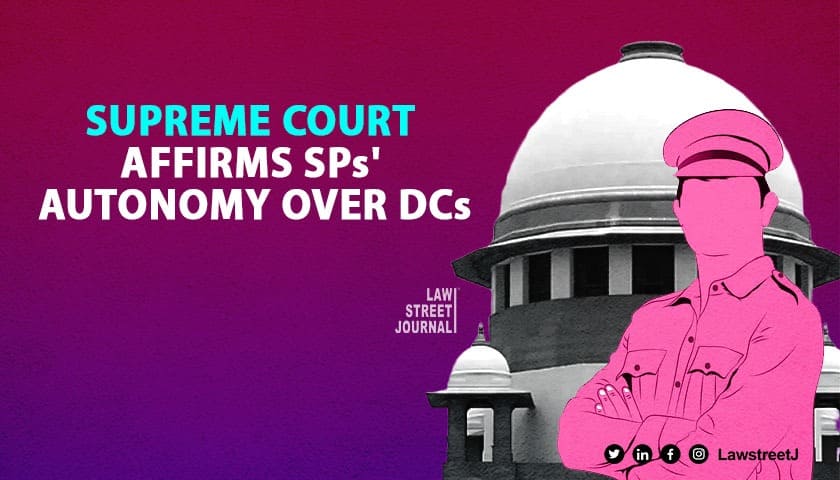NEW DELHI: The Supreme Court has said a Superintendent of Police is required to work under the general control and direction of a Deputy Commissioner but that does not place the IPS officer under the hierarchical supremacy of that IAS officer or State civil service officer.
"Though the SP is required to obey the instructions of the Deputy Commissioner in the first instance, the SP can thereafter request the Deputy Commissioner to refer any difference of opinion between them on any question relating to police administration to the Commissioner, who would decide such reference," a bench of Justices Aniruddha Bose and Sanjay Kumar said.
The court also noted moreover, the SP is at liberty to submit his case to the Inspector General of Police if he is dissatisfied with the decision of the Commissioner.
"It is, thus, clear that a SP is required to work under the general control and direction of a Deputy Commissioner and obey his/her instructions but that does not place the SP under the hierarchical supremacy of that Deputy Commissioner," the bench added.
The court dismissed an appeal filed by the Assam government against the Gauhati High Court's judgment which declared Rule 63(iii) of the Assam Police Manual invalid on the ground that it is in direct conflict with Section 14(2) of the Assam Police Act, 2007 and for allowing a Deputy Commissioner to write the annual confidential report or annual performance appraisal reports of an SP.
The court also pointed out All India Service Rules defined reporting, reviewing and accepting authorities to mean that they must all be from the same service or department.
So intervention by the Deputy Commissioner during the exercise of performance assessment of SPs of the districts in Assam, by virtue of Rule 63(iii) of the Manual, cannot be countenanced. This would tantamount to permitting the Deputy Commissioner to interfere with the internal organisation of the police force, it added.
The bench also said after the separation of powers in terms of the prevailing, the Deputy Commissioner is no longer the head of criminal and police administration in the district.
The police personnel in Assam would be governed by the existing Discipline and Appeal Rules and other Service Conduct Rules in force, as applicable to the Indian Police Service, State Police Service and others serving in the State Police Establishment, the bench said.
"Merely because they are deployed/deputed to work in Assam, IPS Officers cannot be denied the benefit of the 2007 Rules which would be applicable across the board to their ilk serving all over the country. It would, therefore, be incorrect to castigate such IPS Officers as insisting upon a Reporting Authority of their choice. They are merely seeking parity with their kind working in other parts of the country," the bench said.
The bench also said the state government was, no doubt, given discretion to empower any of the authorities who supervise the performance of the officer reported upon to assume such role. However, this discretion cannot be construed to mean that someone from outside the department can be given such power and both authorities must belong to the same service or department, it said.
Under the Rules, when liberty has been given to the SP to disagree with the Deputy Commissioner on any point relating to police administration and seek resolution of such difference of opinion through the Commissioner and, thereafter, the Inspector General of Police, it would be a parody to subject the performance assessment of such a SP to the same Deputy Commissioner with whom he/she had disagreed, the bench said.
Such an ACR/APAR cannot be taken to be impartial and objective, once it is preceded by a difference of opinion between the SP and the Deputy Commissioner, leading to a reference being made to higher authorities. Such a situation must necessarily be avoided to maintain the sanctity of the assessment process, the bench added
















